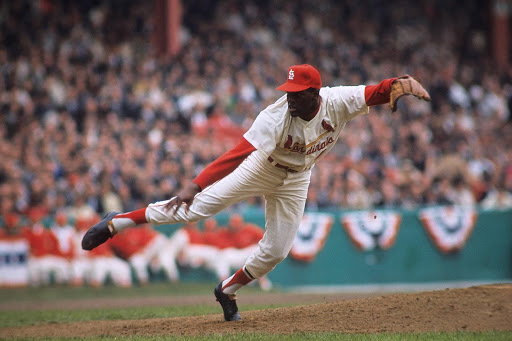Gibby’s Gone Too

It’s been a challenging year on many fronts. But if you’re a St. Louis Cardinal fan (or at least loved the Cardinal teams of the 1960’s as so many throughout the Midwest and South did before the League expanded to Texas, Georgia and Colorado), it just got worse. After just having said good-bye to the great Lou Brock, the Cardinal’s greatest pitcher of all time – and the most fearsome pitcher to ever to take the mound – has died.
After Curt Flood, Bob Gibson was my favorite player and a childhood hero. As a young boy and a pitcher wanna-be, I tried to emulate his big wind-up and free flowing powerful delivery along with his menacing look. I would even occasionally throw one intentionally “inside” if a batter dared to set up too close to “my plate.” Thanks to Bob, at age 8, I developed the reputation as the most feared pitcher in Little League (so I’ve been told), though my pitching career didn’t last very long.
The word “great’ gets thrown around a lot in sports and is often overused. But Bob Gibson was truly great – a first-time Hall of Famer, two time Cy Young winner, two time World Series MVP and the rare pitcher to win the MVP of the league, with 251 wins, 3117 strike-outs, a 2.91 career ERA, 56 shutouts and 255 complete games! (By comparison the Dodgers Clayton Kershaw, generally regarded as the best pitcher of the current generation who some incredibly place ahead of Gibson in pitcher rankings, has less complete games in his entire career than Bob had in a single season.)
And will any pitcher ever repeat what Gibson did in 1968 with a 1.12 ERA along with 15 straight wins and 47 consecutive scoreless innings (it would have been a record 63 innings had it not been for a bad hop single and later a wild pitch eluding a backup catcher)? No one has in the last half century.
Gibby was also the undisputed leader of one of the best teams of the 1960’s – a team that won two World Series (against the Yankees and Red Sox) and lost a third (to the Tigers in a 7th game). He was the consummate “big game” pitcher who was at his best when it mattered the most. Has any pitcher been more dominant in the World Series over his career – where he won 7 straight games over 3 World Series, struck out 92 batters – a record-setting 17 in one game, and posted a career ERA of under 2.00?
As talented and successful as those Cardinals teams were from a baseball perspective, it should also be remembered for being ahead of its time in terms of diversity and its success in integration. The Cardinal star players of my youth were Black (Gibson, Brock, Flood and White), Hispanic (Cepeda and Javier) and naturally White (Boyer, Carlton, Maris and such). They were proud intelligent men who learned to respect each other and their differences and even like one another in an era of far greater racial intolerance than today (a lesson for us all). No doubt a lot of that had to do with their commander in chief Gibby.
That Bob Gibson became one of the greatest baseball players ever is a stunning achievement. As revealed in his classic book “From Ghetto to Glory” Bob grew up without a father (who died 3 months before he was born), poor (one of 7 siblings), sick (plagued by rickets, pneumonia and a heart problem as a child and severe hay fever and asthma that continued throughout his career) and Black (born in an America that offered no baseball opportunity to men of his skin color). It is an incredible underdog story and one of profound perseverance.
Bob didn’t reach the mountain of the mound without fighting ferociously for his place on it, which included employing his trademark intimidation. In reading tributes today from some of the greatest players to ever play the game I had to smile at one by the great Hank Aaron who counseled a young Dusty Baker in no uncertain terms not to mess with Gibson: “Don’t stare at him, don’t smile at him, don’t talk to him. … If you happen to hit a home run, don’t run too slow and don’t run too fast. … And if he hits you, don’t charge the mound, because he’s a Gold Glove boxer.” I love Fernando Tatis, Jr but I think he and his generation would think real hard before bat flipping if they were fortunate enough to hit a home run with Gibby on the mound.
After Bob left the game and returned to his hometown of Omaha – that city’s most famous athlete and second most famous citizen – Bob remained a great ambassador for the Cardinals. (Sadly, the second most famous Omaha athlete Gale Sayers who happened to be mentored by Gibson’s older brother Josh, passed away just a week ago). There was no one I enjoyed seeing more each year on Opening Day in the traditional “Red Jacket” Clydesdale parade of Hall of Famers than the handsome and distinguished Bob Gibson who always carried himself with such honor and distinction. While he was widely regarded as a tough, no-nonsense person who was not always the friendliest guy, he was from all accounts a loyal friend to many with a great smile and sense of humor who gave back to others. In the last few years he struck up a kinship with Cardinals young ace Jack Flaherty and had been counseling him not only about pitching and mental toughness but about being a man. Ironically, it was Flaherty who took the mound on the evening that he died and fittingly pitched masterfully and dominantly despite a losing effort.
The Cardinals’ season is now over but there is always next year. Unfortunately there will never again be another Bob Gibson- this one really hurts.